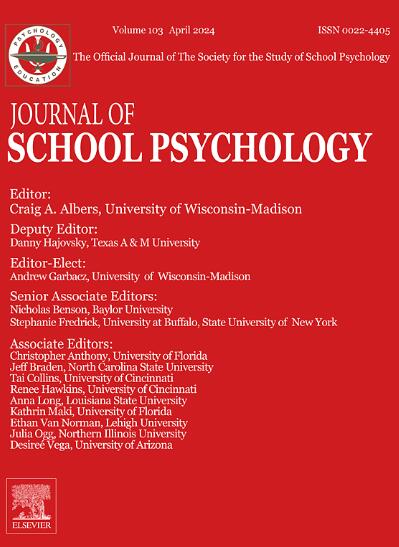有证据表明,学术语言的阅读流畅性与阅读理解之间的关系有限
IF 4.1
1区 心理学
Q1 PSYCHOLOGY, SOCIAL
引用次数: 0
摘要
本研究探讨了年级学术语言的阅读流畅性与阅读理解之间的关系。研究采用 CUBED 叙事性语言测量法(CUBED Narrative Language Measures:阅读(NLM:R)分测验来评估 605 名二、三年级学生的阅读流利性和阅读理解能力。学业进步测量(MAP)阅读评估也用于评估学生的阅读理解能力。结果表明,在使用 NLM:R 进行测量时,在两个年级的任何十等分中,阅读流畅性与阅读理解能力都没有明显的相关性。二、三年级学生的阅读流畅度与 MAP 结果也没有明显的相关性。对种族/民族、性别和社会经济地位进行局部相关性分析后,结果并无明显不同。与阅读更流畅的学生相比,阅读流畅度处于第 10 百分位的学生的理解能力没有明显差异。本研究结果表明,当段落中包含复杂的学术语言时,注重速度和准确性的口语阅读流利度评估结果可能不是阅读理解能力的有效指标。学校心理学家和其他教育工作者在制定与理解相关的教学建议和确定需要进行理解干预的学生时,可能需要谨慎解释阅读流利性数据。本文章由计算机程序翻译,如有差异,请以英文原文为准。
Evidence of a limited relationship between reading fluency and reading comprehension of academic language
This study examined the relationship between reading fluency and reading comprehension of grade-level academic language. The CUBED Narrative Language Measures: Reading (NLM:R) subtest was used to assess the reading fluency and reading comprehension performance of 605 second- and third-grade students. The Measures of Academic Progress (MAP) reading assessment was also used to assess students' reading comprehension. Results indicated that reading fluency was not significantly correlated with reading comprehension across any of the deciles in both grade levels when measured using the NLM:R. Reading fluency also was not significantly correlated with MAP results for second- or third-grade students. Partial correlation analyses controlling for race/ethnicity, gender, and soci-economic status did not result in meaningfully different outcomes. Students whose reading fluency was at the 10th percentile did not exhibit significantly different comprehension performance when compared to students reading more fluently. The results of this study suggest that outcomes from oral reading fluency assessments that focus on rate and accuracy may not be valid indicators of reading comprehension when passages include complex, academic language. School psychologists and other educators may need to interpret reading fluency data with caution when developing comprehension-related instructional recommendations and identifying students for whom comprehension intervention is warranted.
求助全文
通过发布文献求助,成功后即可免费获取论文全文。
去求助
来源期刊

Journal of School Psychology
PSYCHOLOGY, EDUCATIONAL-
CiteScore
6.70
自引率
8.00%
发文量
71
期刊介绍:
The Journal of School Psychology publishes original empirical articles and critical reviews of the literature on research and practices relevant to psychological and behavioral processes in school settings. JSP presents research on intervention mechanisms and approaches; schooling effects on the development of social, cognitive, mental-health, and achievement-related outcomes; assessment; and consultation. Submissions from a variety of disciplines are encouraged. All manuscripts are read by the Editor and one or more editorial consultants with the intent of providing appropriate and constructive written reviews.
 求助内容:
求助内容: 应助结果提醒方式:
应助结果提醒方式:


